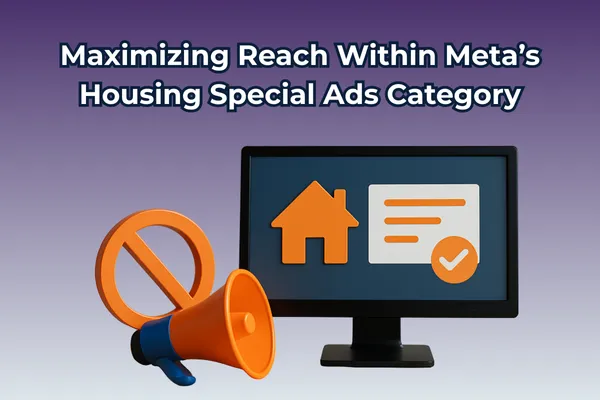
Maximizing Reach with Meta's Housing Special Ad Category | Real Estate Marketing Tips
Maximizing Reach Within Meta's Housing Ad Restrictions
Running effective housing ads on Meta can be challenging, especially with the strict targeting restrictions under the Special Ad Category for Housing. These rules are designed to promote fairness and reduce discrimination, but they also limit how real estate agents can reach their ideal audiences. In this blog, we'll cover the common mistakes agents make, practical strategies to maximize ad reach, and how to stay ahead of evolving ad policy changes.
Common Mistakes Agents Make with Meta's Housing Special Ad Category
Over-Targeting Competitor Interests
One of the biggest mistakes agents make is targeting competitor interests like "Zillow" or "Realtor.com." This might seem smart, but it often attracts other agents rather than potential homebuyers. These platforms are not just used by buyers and sellers but also by other real estate professionals, which can dilute the quality of your leads. Instead, focus on interests that reflect a buyer's journey, like "first-time homebuyer" or "moving tips."Trying to Use Age-Based Targeting
Despite the temptation, age-based targeting is strictly prohibited within the Special Ad Category. This can be particularly frustrating for agents working in 55+ communities, where age is a key demographic factor. However, Meta's ad policies are clear – you cannot directly target based on age, gender, or ZIP code. Ignoring this can lead to unnecessary ad rejections and account restrictions.Using Discriminatory Language in Ad Copy and Images
Many agents overlook the fact that Meta scans both ad copy and images for potentially discriminatory language. This includes phrases like "perfect for families," "ideal for singles," or "great for seniors." Even the images used in your ads can trigger rejections if they imply age, family status, or other protected categories. Instead, use inclusive language that focuses on the benefits of the property or lifestyle rather than the people who might live there.
Top Strategies for Maximizing Reach Within the Special Ad Category
Focus on Lifestyle and Psychographics
Instead of trying to target demographics directly, focus on lifestyle and psychographic interests. For example, if you're targeting 55+ communities, highlight benefits like proximity to medical care, senior centers, or public transportation. You can also include interests like "active lifestyle," "gardening," or "travel," which might appeal to this age group without directly referencing age.Leverage Home Improvement Interests
Homeowners are more likely to engage with content related to home improvements, as renters typically don't invest in these upgrades. Use interests like "kitchen remodeling," "landscaping," or "home maintenance" to indirectly reach potential homeowners without breaking the rules.Highlight Family-Friendly Features Indirectly
If you're targeting families, avoid direct references to parents or children. Instead, focus on family-friendly features like "proximity to parks," "top-rated schools," or "large backyards." These signals can attract the right audience without violating Meta’s ad policies.Use Retargeting Wisely
Retargeting is one of the most effective strategies within the special ad category. Use custom audiences from your existing customer list or website visitors. This approach is more cost-effective and reaches people who already know your brand, increasing the likelihood of conversions.Leverage Meta’s Instant Forms
Instead of directing users to an external landing page, which can trigger policy violations, consider using Meta’s built-in lead forms. These forms are less likely to be rejected and provide a seamless user experience, reducing friction and boosting lead quality.
Real-Life Success Story
At our agency, we've had significant success targeting the 55+ niche by focusing on psychographics and lifestyle rather than direct age-based targeting. For instance, we use images of single-story homes (since many seniors prefer to avoid stairs) and include interests like "bingo" or "travel" in our ad copy. This approach has consistently generated high-quality leads without triggering rejections. We've also avoided common pitfalls like using phrases such as "perfect for seniors" or "ideal for retirees," which can quickly get your ads flagged.
Future Trends in Meta's Ad Policies
Meta is increasingly relying on AI to enforce ad policies. This means your ads are not just being reviewed for text but also for the images used and the landing pages linked. Meta's AI scans for potentially discriminatory language or imagery that might not align with its policies. This trend is likely to continue, making it essential for agents to pre-test their ads using AI tools before launch. This proactive approach can save you from costly rejections and account suspensions.
Final Tips for Agents
Focus on Retargeting – Use custom audiences for retargeting, as this is both more cost-effective and more likely to convert. These audiences already know your brand, making them more receptive to your message.
Use Meta’s Instant Forms – Consider using Meta's built-in lead forms to reduce the risk of ad rejections due to landing page issues. These forms keep users on the platform, improving conversion rates and reducing compliance risks.
Test and Refine Regularly – Run your ad copy and creative through AI tools before submission to catch any potential policy violations early.
Frequently Asked Questions
What is the Meta Special Ad Category for Housing?
This category imposes strict targeting rules for housing ads to prevent discrimination and ensure fair access to housing opportunities. It covers ads related to home sales, rentals, and real estate services.
Can I target by age or ZIP code?
No, targeting by age, gender, or ZIP code is prohibited under this category to avoid discriminatory practices.
How can I reach the right audience if my targeting is restricted?
Focus on interests, lifestyle, and psychographics like home improvement, local amenities, or lifestyle preferences.
Do images also need to comply with Meta's ad policies?
Yes, Meta's AI scans both the text and images in your ads to ensure they comply with its anti-discrimination policies. Be mindful of the visuals you choose.
What should I do if my ad gets rejected?
Review the rejection reason carefully, make the necessary edits, and resubmit. If you believe your ad was wrongly rejected, you can appeal the decision through Meta's support.
Disclaimer
This content is provided for informational purposes and is not intended to indicate any preference, limitation, or discrimination based on race, color, religion, sex, handicap, familial status, or national origin. All housing advertised herein is available on an equal opportunity basis.

